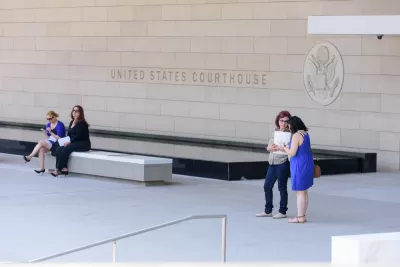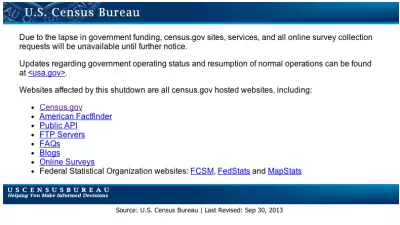Cities fear federal funding cuts if the citizen question stays on the Census and results in an undercount of Latino populations.

The Trump administration's attempt to include a citizenship question on the 2020 Census has made a hard job harder for cities. Hard-to-count populations from recent immigrants may be less likely to want to fill out census forms if they think they will be asked to prove they are citizens. Not counting these people would have huge consequences for political representation and federal dollars. “The census determines how some $800 billion in federal spending is divided every year between funds for transportation, aid for housing and healthcare, and more,” Kriston Capps reports for CityLab.
Whether or not the question will appear remains an open question, while a district court found many "administrative law violations by Commerce Secretary Wilbur Ross," Capps reports, this is not the last legal word on the matter. "Whether the 2020 count features a question about citizenship will likely fall to the U.S. Supreme Court—maybe even before an appeals court takes up the case, if the Department of Justice gets its way," Capps reports.
For majority Latino communities this could mean disinvestment on a massive scale. "For James Diossa, the young Latino mayor of Central Falls, Rhode Island—a Providence suburb of 19,000 residents with a Latinx population upward of 70 percent—anxiety over the 2020 census is far from abstract," Capps writes. Mayors are looking for ways to help a program federal administrators seem dead set on sabotaging.
FULL STORY: Cities Are Bracing for 2020 Census Chaos

Study: Maui’s Plan to Convert Vacation Rentals to Long-Term Housing Could Cause Nearly $1 Billion Economic Loss
The plan would reduce visitor accommodation by 25% resulting in 1,900 jobs lost.

Alabama: Trump Terminates Settlements for Black Communities Harmed By Raw Sewage
Trump deemed the landmark civil rights agreement “illegal DEI and environmental justice policy.”

Why Should We Subsidize Public Transportation?
Many public transit agencies face financial stress due to rising costs, declining fare revenue, and declining subsidies. Transit advocates must provide a strong business case for increasing public transit funding.

Paris Bike Boom Leads to Steep Drop in Air Pollution
The French city’s air quality has improved dramatically in the past 20 years, coinciding with a growth in cycling.

Why Housing Costs More to Build in California Than in Texas
Hard costs like labor and materials combined with ‘soft’ costs such as permitting make building in the San Francisco Bay Area almost three times as costly as in Texas cities.

San Diego County Sees a Rise in Urban Coyotes
San Diego County experiences a rise in urban coyotes, as sightings become prevalent throughout its urban neighbourhoods and surrounding areas.
Urban Design for Planners 1: Software Tools
This six-course series explores essential urban design concepts using open source software and equips planners with the tools they need to participate fully in the urban design process.
Planning for Universal Design
Learn the tools for implementing Universal Design in planning regulations.
Smith Gee Studio
Alamo Area Metropolitan Planning Organization
City of Santa Clarita
Institute for Housing and Urban Development Studies (IHS)
City of Grandview
Harvard GSD Executive Education
Toledo-Lucas County Plan Commissions
Salt Lake City
NYU Wagner Graduate School of Public Service





























